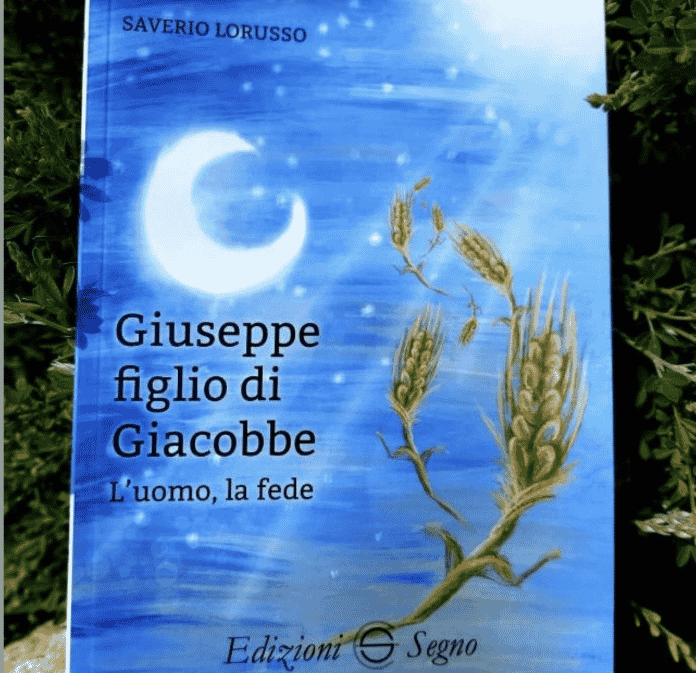In a frontal and normative process, in which it is possible to say about God by speaking of the human being, it is difficult to cultivate pietas towards the Lord and towards our fellow men. In this regard, Saverio Lorusso, in his book “Joseph son of Jacob, man and faith”, focuses on the revelatory communication of the Most High in the understanding of the identity of the individual.
In your book “Joseph son of Jacob” who is the man Joseph and what faith moves him?
The Joseph you meet in my book is a young man who is in the age of life between adolescence and maturity, called “handsome in shape and attractive in appearance” (Gn. 39,6), characteristics that he had inherited from sweet and beautiful Rachel, his mother.
The personality of the young protagonist is evident from the biblical texts, in fact he appears as a young man faithful, mature, responsible, wise and full of common sense, respectful towards his father Jacob and esteemed by the latter, from whom he learns the wisdom, the faith, morals and customs. Furthermore, he keeps himself away from evil, morally upright, manifests feelings of concern and attention towards his brothers, but at the same time for his young age he presents traits of naivety, appears markedly sentimental and excessively sincere, all accompanied by a serious inability to master the language.
He is also the man of dreams, desires, the spirituality of desire, in short, a visionary who looks beyond and before others.
This is generally the psychological, moral and human profile of the young son of Jacob, in his qualities and in his deficiencies.
Furthermore, in this complex story, Joseph appears as a fascinating figure, an exemplary and virtuous boy who matures in his existential journey and in his journey of faith an extreme trust in God, in the God of his father, in the God of Abraham.
The faith of this man was born, first of all, from a sincere and profound relationship with his father Jacob, of whom he became a preferential auditor and from this singular and privileged relationship his being pontiff of his father’s love for his brothers springs. his unconditional yes to Love, his becoming a servant of family peace, his being for others in inconvenience, difficulty and danger, his proven vocation and his love betrayed by those he tried to serve, precisely his siblings.
Joseph’s faith is a gift received from listening to the Word that his father Jacob will give him and that in him will be the task to be carried out through a place and tiring human and spiritual journey.
Giuseppe remains a very current figure that must be rediscovered, whose story placed in the mirror with our individual existences, I think can be revealing of ourselves, revealing a self not yet perceived and understood in such a sense.
The facts and words that are announced and consequently heard, in the story of the young Jew betrayed and sold by his brothers, if correctly understood, could become interpretative keys of the experiences of every single man and the latter could find his most authentic in the Sacred Words. and a profound horizon of meaning.
In short, I think it is worth reading the book “Joseph son of Jacob, man and faith”, as this story, as I interpret it in my work, could pleasantly surprise the reader and forward him in unpublished understandings of the self, of us and of God.
What is meant by “theological anthropology”?
The etymological meaning of the word “anthropology”Comes from the Greek and the lemma is made up of the prefix àthroposprecisely manand the suffix logosthat is thought…word…speechthat is reasoning-discourse on mantechnically science that deals with human nature.
Anthropology, in general, wonders “Who is the man” from the social, cultural, natural, political, psychological, etc … point of view, philosophical anthropology, then, invites us to reflect on “Who is man in his search and asks for meaning and meaning”.
Finally, theological anthropology wonders “Who is the man for God” in its greatest semantic horizon, man as well as God thought and wanted him.
From the perspective of theological anthropology, human identity, understood as a single individual, rests on what God reveals to the individual man about himself.
Therefore, theological anthropology is not only a knowledge centered on reflection on God, but a gnosis on man, fruit of God’s initiative, precisely part of “Revelation”. In short, God chooses to meet man and to tell him where he comes from, who he is, what his task is in the world, how he can fully fulfill himself, where he is headed, what his ultimate goal is and what means are needed. to reach it.
In the part of the Old Testament text that concerns the story of Joseph and his family, God seems absent, we do not witness direct interventions by God, nor visions, nor revelations, nor prophecies, it seems that men are the only protagonists of history yet God works and through faith His Presence is discovered. How to interpret this fact?
The Hebrew word “midbar “ it means “desert … silence … absence … hiding “ and has the same root as the word “dabar “that is to say “word, understood as an event of divine revelation “.
Thus the concept of speaking or keeping silent about God becomes synonymous with a single, however different revelation of God.
Having clarified this fact, however, I would like to reflect on the human heart. In fact, according to Eastern Christian spirituality, the believer must do “pay attention to the heart “.
This Attention it consists in being attentive to oneself in order to be attentive to God.
Thus, the man who progressively abandons sin and is constantly converted to God, slowly develops a “connaturality ” with the spiritual world.
Pay attention to this connaturality and to his voicefor Eastern Christian spirituality, it means perceiving the divine mysteries as they are in us, as they enter our life.
According to the theologian Tomas Spidlik the heartas I explained and understood above, is the place where divine transcendence and human immanence meet and enter into a dialectic capable of exchanging their own prerogatives.
So understood, says T. Spidlik“The heart becomes a source of revelation”.
In this way, understanding the apparent absence of God in the biblical story of the young Joseph and his family, we find a possible hermeneutic key.
In fact, God does not speak, but reveals himself to the believing and journeying heart of Joseph and by remaining faithful to himself and to the divine voice that he intends in his heart through faith, he interprets his own vicissitudes and those of his family, becoming the savior of his blood relatives. and of the entire Egyptian people, for this the sacred text says “The Lord was with Joseph”, It was in this man by his faith.
In the last book of Genesis, “Bereshit,” the focus is on Jacob and the entire family of Joseph. In an almost anachronistic way, can it be concluded that, even today, the roots we come from influence our choices?
I think it is enough to look at our splendid peninsula, our cities, our churches, our squares, our works of art and all the culture produced by our compatriots over the centuries, to understand how much the Jewish-Christian culture has influenced our ways to think, live, build, create and elaborate the human existence in all its versatility.
It must be considered that all the great European poets, writers and artists of the past, remote and recent, counted in their life path at least one trip to the Bel Paese, as a sort of spiritual, cultural and artistic initiation, from which to find inspiration and vision in the own creative process.
Today, however, in the post-modern period, by now practically de-Christianized, where the individual is isolated in the mass-media and technological-digital circus in a sort of voluntary isolation, devoid of the awareness of his own human, cultural and spiritual roots, I see it difficult and practically unlikely a real influence of Christian thought on the individual and on the whole of today’s society.
This fact, however, opens the field to a vision of the present charged with commitment capable of spreading Christian thought and existence again in a work to be done, not on the masses, but on individual existences, through the transmission of the faith from heart to heart, from life to life.
Leaving aside pericopes and hermeneutics, what message does the Christian kerygma contained in the Sacred Texts testify and pass on?
I will answer this question using the thought that the philosopher Kierkegaard expresses in his work “Crumbs of philosophy and unscientific annotation”, who writes: “All my literary activity is related to Christianity, to the problem of becoming Christian (…) against the illusion that “all are Christians” ».
To unmask this misunderstanding, the philosopher emphasizes that Christian truth is not so much or only “doctrine”, but essentially a “communication of existence” (kerygma), that is, it is truth about man when it becomes “existence” in him, that is, testimony of life.
He argues that Christianity moves in a precise vital dynamic: proclamation of the Gospel, through words and deeds, precisely the kerygma, listening to and accepting this proclamation leads to the examination of life and the awareness of sin. of the individual, who in the Messiah Jesus of Nazareth finds his own spiritual and existential rebirth through the imitation of the Christ model.
In other words, when the received Gospel becomes existence in the individual, first, and in the community, later, then the Christian can be defined as such and the whole of the individuals becomes Church, in its truest and most authentic exception.
The Danish philosopher goes on to say that Christianity is such when it becomes the bearer of the paradox, in fact Christ, the Man-God is a scandal for the categories of reason and his resurrection is foolishness for the world. Therefore, he concludes by writing: “It is not the doctrine that must be revised (…) it is the existences that must be revised”, starting from the kerygma, from welcoming the announcement of Christ who died and rose for our sins who becomes the generator of new life to be fulfilled in the today of individual believers.



